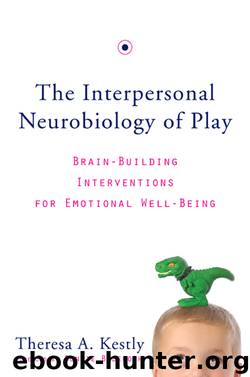The Interpersonal Neurobiology of Play by Theresa A. Kestly

Author:Theresa A. Kestly
Language: eng
Format: epub
Publisher: W. W. Norton & Company
Organization and Predictability
Keeping the playroom organized can be a challenge, but it is especially important for patients who have been traumatized by the loss of control that is so often a part of the traumatic experience. Being able to find a specific object in a specific place offers predictability in a world that seems all too unpredictable. I once worked with an adult woman who was making sand trays regularly to deal with old wounds of severe childhood physical and sexual abuse. Without exception, she would begin her sand tray building process by going to the shelves to find a very small and very specific white owl. That little owl was in every sand tray that she built, and it seemed to anchor and connect her trays over time. She never named the object as an owl, nor did she ever say what it meant to her, but I could sense her relief every time she reached for it and placed it in her world. This patient needed me to keep the playroom organized so that she could find the object that was precious to her consistently in its place.
Cleanup issues seem like a mundane topic in the context of the interpersonal neurobiology of play. Nonetheless, how we handle cleanup can serve as an important opportunity to communicate to a child that the playroom is a special place where normal expectations of being neat and orderly do not necessarily hold. Allowing a child to leave the play space without cleaning up helps to establish a permissiveness that is helpful in creating an emotional neuroception of safety. It communicates to the child that what he or she does and says (or doesn’t do and say) in the playroom is acceptable.
This value of permissiveness in the playroom can be very difficult for some parents, and I think it is important to discuss with them the interpersonal implications. When indicated, I try to address their fears that the permissiveness of the playroom will spoil their children, and I assure them that it is also okay to have rules at home for cleanup and organization. When I introduce the child to the playroom (usually with the parent present), I might say something like this:
“This is a special playroom, and in here you can do anything you like, and if there is something that you can’t do, I will let you know. In here we don’t have to clean up when we are finished playing. It’s only here though, because I know you still have cleanup rules at home.”
When I talk with parents about the permissiveness in the playroom, I try to make sure that they understand that I am not giving their child license to misbehave.
Download
This site does not store any files on its server. We only index and link to content provided by other sites. Please contact the content providers to delete copyright contents if any and email us, we'll remove relevant links or contents immediately.
Periodization Training for Sports by Tudor Bompa(8254)
Why We Sleep: Unlocking the Power of Sleep and Dreams by Matthew Walker(6706)
Paper Towns by Green John(5179)
The Immortal Life of Henrietta Lacks by Rebecca Skloot(4576)
The Sports Rules Book by Human Kinetics(4379)
Dynamic Alignment Through Imagery by Eric Franklin(4208)
ACSM's Complete Guide to Fitness & Health by ACSM(4057)
Kaplan MCAT Organic Chemistry Review: Created for MCAT 2015 (Kaplan Test Prep) by Kaplan(4008)
Introduction to Kinesiology by Shirl J. Hoffman(3766)
Livewired by David Eagleman(3764)
The Death of the Heart by Elizabeth Bowen(3610)
The River of Consciousness by Oliver Sacks(3599)
Alchemy and Alchemists by C. J. S. Thompson(3515)
Bad Pharma by Ben Goldacre(3422)
Descartes' Error by Antonio Damasio(3270)
The Emperor of All Maladies: A Biography of Cancer by Siddhartha Mukherjee(3148)
The Gene: An Intimate History by Siddhartha Mukherjee(3094)
The Fate of Rome: Climate, Disease, and the End of an Empire (The Princeton History of the Ancient World) by Kyle Harper(3055)
Kaplan MCAT Behavioral Sciences Review: Created for MCAT 2015 (Kaplan Test Prep) by Kaplan(2984)
